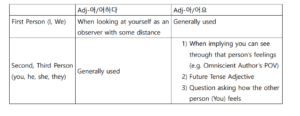Beginner 2 > Lesson 24
Lesson 24. Adj-아/어하다 : Adjective in Third-person’s POV | Making Adjective into Verb #2
📥Download the same blank class note used in the lesson
Adj-아/어하다 (making adjective into verb#2)
- Adj-아/어하다 is used to describe someone else’s feelings that are seen by you.
- Therefore, it is mostly used with third person pronouns like: He, She, They; or with second person pronoun: You as Subjects in the sentence.
For example: 1) 엄마가 슬퍼요 (Mom is sad) → 2) 엄마가 슬퍼해요 (Mom is sad)
It is more natural to use the second sentence (adj-아/어하다) from the above examples as it reports Mom’s feelings seen by you.
Ex. 제 친구가 축구 경기에서 이기고 나서 엄청 기뻐했어요 = My friend was very happy after winning at the soccer match.
However, it isn’t completely incorrect to use the first sentence (using adjective alone) either.
- Using Adjectives on their own:
a)In general instances:
Adjective on its own, without the 아/어하다 form attached to it, is used only when you can clearly see through someone else’s feelings or are 100% sure of their emotions/feelings.
For instance, when writing a story, the author is aware of their character’s emotions and in such a case, using Adjective alone is common.
b) When speaking in the future tense, it is okay to use both: Adjectives on their own and Adjective+아/어하다.
Ex. 그 소식을 듣고 엄마가 엄청 기뻐할 거예요/기쁠 거예요 = Mom will be very happy to hear that news.
c) When asking questions of how the other person i.e., the listener feels:
Second Person (Adjective alone is used) | Third Person (Both can be used but Adj+아/어하다 is more natural) |
Are you sad? = 슬퍼요? | Is Jisoo disappointed? = 지수가 섭섭해요?/섭섭해해요? |
Are you happy? = 행복해요? | Is dad happy? = 아빠가 행복해요?/행복해해요? |
- Using Adj+아/어하다:
a)With Adjectives of feelings and emotions:
Ex. 감사하다/고맙다 (to be thankful) → 감사해하다/고마워하다
지민 씨한테 고마워하는 사람들이 많아요 = There are many people who are thankful for Mr. Jimin.
Ex. 미안하다 (to be sorry) → 미안해하다
저는 지수한테 화가 많이 났지만 지수가 진심으로 미안해해서 용서해줬어요 = I was very angry at Jisoo but as she was sincerely sorry, I forgave her.
Ex. verb-고 싶다 (to want to be ‘verb’) → verb-고 싶어하다
너 이 인형 갖고 싶어했잖아. 그래서 네 생일선물로 준비했어 = You wanted to have this doll so I prepared it as a birthday gift for you.
Ex. 덥다 (to be hot) → 더워하다
아이들이 더워해서 에이컨을 틀었어요 = The children seemed to be hot so I turned on the air condition.
Ex. 춥다 (to be cold) → 추워하다
고양이가 추워해서 이불을 덮어줬어요 = The cat was cold so I covered it with a blanket.
Ex. 배 고프다 (to be hungry) → 배 고파하다
밥이 언제 돼요? 아이들이 배 고파해요! = When will the food get ready? The children are hungry!
NOTE: Adj-아/어하다 is a transitive verb, which means it can have an object; hence what someone finds adjective is marked by object marking particle(을/를).
Ex. 어렵다 (to be difficult) → 어려워하다
많은 사람들이 이 문법을 어려워해요 = Many people find this grammar difficult.
Ex. 지루하다 (to be boring) → 지루해하다
제 친구들은 한국어 공부를 지루해하는데 저는 재미있어요 = My friends find studying Korean boring but I find it fun.
Ex. 자랑스럽다 (to be proud) → 자랑스러워하다
엄마는 제 동생을 자랑스러워하세요 = My mother is proud of my younger sibling.
b) Using Adj-아/어하다 in First person.
It is possible to use ‘First person Subject + Adj-아/어하다’ when you are seeing yourself as an observer with some distance.
Ex. 저는 어렸을 때 의사가 되고 싶어했어요 = When I was younger, I wanted to become a doctor.
Ex. 저는 비가 올 때마다 우울해해요 = Every time it rains, I feel gloomy.
c) Common Verbs often used with all First, Second and Third person Subjects
A common example of usage of Adj-아/어하다 is found in the formation of verbs like 좋아하다, 싫어하다, 예뻐하다 etc.
- Noun 이/가 좋다 → Noun 을/를 좋아하다
- Noun 이/가 싫다 → Noun 을/를 싫어하다
‘좋다’ (to be good; to like) and ‘싫다’ (to hate) are Adjectives that are used most commonly in First person, while ‘좋아하다’ and ‘싫어하다’ are Verbs that can be used with all First, Second or Third person Subject.
Ex. 엄마는 요리를 좋아해요 = Mom likes cooking.
Ex. 저는 공부가 싫어요/공부를 싫어해요 = I hate studying.
- Noun 이/가 예쁘다 → Someone 을/를 예뻐하다
예쁘다 and 예뻐하다 can also be used as a feeling meaning ‘someone is precious’ to you.
Ex. 저는 제 아들이 제일 예뻐요 = 저는 제 아들을 제일 예뻐해요 = My son is the most precious to me.
Ex. 선생님은 지수를 제일 예뻐하세요 = The teacher adores Jisoo the most.
- Noun 이/가 밉다 → Someone을/를 미워하다
밉다 means 1) to be ugly and 2) to hate, and 미워하다 is its verb form. They can also be used as a feeling meaning ‘to hate someone.’
The difference between 밉다 and 싫다 would be that 밉다 still has some intimacy in it, whereas in 싫다, there is not one drop of affection.
Ex. 선생님은 지수만 예뻐하시고 저는 미워하세요 = The teacher only adores Jisoo and hates me.
[Quick Summary]


